A New Frontier for Swiss Capital
Ukraine’s post-war reconstruction stands as one of the most ambitious economic and humanitarian undertakings of the 21st century. The destruction of infrastructure, housing, and industry is immense, yet it creates an equally immense opportunity: to rebuild a sovereign nation on modern, sustainable, and transparent foundations. For global investors, this is not only a matter of returns but of historical responsibility. Swiss family offices and asset managers—renowned globally for their stability, discretion, and long-term orientation—are uniquely positioned to participate in Ukraine’s reconstruction. Switzerland offers a rare blend of political neutrality, robust legal infrastructure, advanced financial expertise, and direct governmental commitment to Ukraine’s recovery. Together, these elements form a strong platform from which private capital can be mobilized into rebuilding a European nation.
This article explores in depth how Swiss family offices and asset managers can engage in Ukraine’s recovery process. It examines the regulatory environment in Switzerland, the government’s bilateral and multilateral frameworks, sectoral opportunities, portfolio strategies, risk factors and mitigations, investment structures, and the broader strategic advantages of Switzerland as a hub for such capital flows.
The Swiss Regulatory Landscape for Family Offices
Unlike some jurisdictions that impose rigid definitions and licensing regimes, Switzerland has adopted a pragmatic approach to family offices. There is no specific “Family Office Act.” Instead, the regulatory framework depends on the scope of activities:
Single-family offices (SFOs) that manage only one family’s assets generally fall outside licensing requirements.
Multi-family offices (MFOs) serving external clients must comply with financial regulation and, since 2020, may require a FINMA license under the Financial Institutions Act (FinIA) if they provide investment management services to third parties.
Both SFOs and MFOs must comply with the Anti-Money Laundering Act (AMLA), ensuring due diligence and transparency.
The introduction of the Financial Institutions Act (FinIA) and the Financial Services Act (FinSA) in 2020 tightened standards for client protection. MFOs now operate similarly to asset managers, with obligations on disclosure, transparency, and suitability. This has increased professionalism in the sector without stifling its entrepreneurial capacity.
In 2024, Switzerland launched the Limited Qualified Investor Fund (L-QIF) regime, enabling qualified investors to establish funds without prior FINMA approval. This development provides family offices with a fast and flexible vehicle to pool capital for innovative projects—including Ukraine’s reconstruction—while still benefiting from Swiss governance and fund management expertise.
In short, Swiss family offices enjoy a regulatory environment that is clear, stable, and adaptable. They are free to pursue long-term, illiquid, impact-oriented investments, such as those in post-war Ukraine, while maintaining high standards of compliance and governance.
Switzerland’s Commitment to Ukraine’s Reconstruction
In June 2025, Switzerland’s Federal Council approved the draft of a bilateral cooperation
agreement with Ukraine, cementing the legal foundation for Swiss companies and investors
to participate in reconstruction projects. Signed at the July 2025 Ukraine Recovery
Conference in Rome, this state treaty underscores Switzerland’s long-term commitment and
specifically encourages the Swiss private sector to get involved.
Under the agreement, Switzerland will provide non-repayable financial assistance to Ukraine
for buying Swiss goods and services needed for rebuilding. Priority sectors include energy,
transportation, machinery, construction, water supply, and disaster prevention – areas
where Swiss firms have expertise. Crucially, the agreement seeks to remove a key hurdle:
initially only Swiss companies already operating in Ukraine could easily join reconstruction
efforts, in the future firms (and by extension their investors) without a prior Ukrainian
presence shall be allowed to participate under an official legal framework.
These measures are part of a broader Swiss package. In February 2025, Switzerland has
committed CHF 1.5 billion to Ukraine through 2028 under its 2025–2028 Country
Programme, with CHF 500 million specifically allocated to catalyze Swiss private-sector
engagement. By 2036, total Swiss commitments are expected to reach CHF 5 billion. This
funding co-finances reconstruction projects and often pairs Swiss technical expertise with
capital.
At the 2025 Ukraine Recovery Conference in Rome, Switzerland, together with the EBRD,
launched the Ukraine Recovery Guarantee Facility (URGF). This pioneering scheme
provides war-risk insurance and strengthens Ukraine’s domestic insurance market. By
covering political and conflict-related risks, the URGF directly addresses one of the greatest
concerns of private investors.
Since hosting the initial Ukraine Recovery Conference in Lugano in 2022, Switzerland has
been a champion of transparency and anti-corruption standards in Ukraine’s
reconstruction. The Lugano Principles, adopted at this first Ukraine Recovery Conference,
stress accountability, rule of law, and governance. By embedding these principles into
reconstruction efforts, Switzerland signals to private investors that investments will occur
under frameworks designed to minimize misuse and maximize impact.
Sectoral Opportunities for Swiss Capital
Ukraine’s reconstruction spans virtually every sector of the economy, offering diverse
opportunities for investors with a long-term horizon.
Infrastructure and Urban Development: The war’s devastation means rebuilding roads,
bridges, railways, harbors, housing, and municipal utilities is urgent. Urban infrastructure
projects – from repairing war-damaged water systems to constructing affordable housing–
are already underway with international support. For example, European partners launched funds in 2024–25 to modernize Ukraine’s electricity grid, public transit, and border logistics.
With multilateral guarantees available, these projects can generate steady returns (through
user fees or government contracts) once peace allows normal economic activity to resume.
Energy & Renewables: Ukraine’s energy sector requires massive investment – not only to
repair destroyed power plants and transmission lines, but to modernize and “green” the grid.
There is demand for new renewable energy installations (solar, wind, hydro) and
decentralized energy solutions to build resilience against future disruptions. International
financing has targeted grid war-proofing and expanding renewables. Energy projects often
benefit from long-term power purchase agreements, providing investors with predictable
income. Importantly, rebuilding the energy sector is a top priority for donors (ensuring co-
financing). This means private investors can ride on substantial public support in this sector.
Industry and Manufacturing: War damage to factories and supply chains creates an
opening to build back better in Ukrainian industry. Sectors like steel, manufacturing,
chemicals, and critical raw materials will need capital to replace or modernize facilities. There
is also an impetus to develop dual-use technologies and defense-related production
domestically. An encouraging sign for investors: even during conflict, large foreign
investments are happening. In 2023, for example, the French holding company NJJ injected
€1.5 billion to acquire and merge Ukrainian telecom operators – the largest FDI in decades,
aimed at upgrading digital infrastructure with backing from IFC and EBRD. This shows that
strategic industries with growth potential (like telecom, tech, agribusiness) can attract big
capital. Additionally, Ukraine’s eventual EU accession prospects imply that industrial
investors today could benefit from future access to a large tariff-free market and integration
into European value chains.
Agriculture and Food: Often called Europe’s breadbasket, Ukraine’s agricultural sector is
critical not just for Ukraine but global food supply. The war hit farming through landmines,
destroyed storage, and export route blockades, but rebuilding efforts target modernizing
agriculture and food processing. Investors can fund grain storage facilities, rail links to ports,
high-tech farming equipment, or food processing plants to increase value-added exports.
Notably, Swiss companies are already investing in Ukraine’s food industry. In late 2022,
Nestlé announced a CHF 40 million investment for a new food factory in western Ukraine; by
2025 the plant opened as an export-oriented production hub. This facility sources most raw
materials locally and supplies EU markets, exemplifying the kind of integrated agri-business
opportunity available.
Beyond these core sectors, opportunities extend to digital and tech startups, healthcare
(building or equipping hospitals), and services (banking, IT outsourcing) as the
economy recovers. Ukraine’s large, educated workforce and relatively low production costs
can be an advantage for investors entering early.
For Swiss wealth managers accustomed to mature markets, the upside of Ukraine’s
reconstruction is the growth potential – essentially rebuilding an entire modern economy,
largely from scratch, with extensive international backing.
Diversification and Long-Term Strategy
From a portfolio standpoint, Ukraine reconstruction investments should be seen as long-
term, high-impact allocations – likely comprising a modest percentage of a diversified
portfolio. Swiss family offices and wealth managers are typically prudent, often spreading
assets across public markets, real estate, private equity, and alternatives. Investing in war-
torn Ukraine’s recovery falls into the alternative or frontier investment bucket, one that can
deliver uncorrelated returns and tangible social impact, but at higher risk.
The logic is similar to allocating to an infrastructure fund or an emerging market private
equity fund: you expect a long holding period (10+ years), illiquidity, and a risk-return profile
higher than developed-market bonds or equities, but with potentially outsized rewards if
Ukraine’s economy flourishes.
In practice, a Swiss asset manager might carve out a sleeve of an alternative portfolio
specifically for “Ukraine Reconstruction & Impact” investments, alongside other impact
investments or opportunistic plays. This aligns with the idea of investment diversification: by
participating in Ukraine’s rebuild, a family office not only seeks financial returns but also
geographic diversification (exposure to Eastern Europe) and sector diversification
(infrastructure, energy, etc.).
Another important aspect is time horizon. Rebuilding a nation is a gradual process – many
projects (power stations, highways, housing developments) will take years to complete and
even longer to generate steady cash flows. Family offices, often freed from the quarterly
performance pressures of institutional funds, are well-suited to such patient capital
deployment.
Many wealthy families have philanthropic or social goals alongside financial ones. Investing
even a small portion of the portfolio in Ukraine’s reconstruction can satisfy impact investing
objectives – helping a country rebuild schools, hospitals, and businesses – while still aiming
for a profit. This dual benefit can be attractive to family principals and beneficiaries who seek
meaning in their investments. The key is to structure these deals in a way that the risks are
understood and mitigated, which leads to the next critical consideration: risk management.
Risk Factors and Mitigation Strategies
No discussion of investing in Ukraine can ignore the risks – they are significant but
increasingly being addressed through international mechanisms.
Security and Geopolitical Risk: The foremost concern is the ongoing war and uncertainty
about when a lasting peace will take hold. Assets on the ground face physical destruction
risk from conflict. There’s also geopolitical uncertainty – the trajectory of Ukraine’s relations
with Russia and its Western allies will influence reconstruction. Mitigation: Many investors
are focusing on relatively safer regions (e.g. western Ukraine) or projects that can be
secured. More importantly, new war-risk insurance facilities are coming online to cover
damage from conflict. In 2023–24, the EBRD, with partners like global insurer Aon and
support from countries like Switzerland, launched an innovative war-risk reinsurance
program to protect investments. This Ukraine Recovery Guarantee Facility (URGF) can
insure projects against war-related losses, making banks and investors more willing to lend.
Political and Legal Risk: Investing in a country at war raises questions about governance,
legal enforcement, and policy stability. Will contracts be honored and courts function
effectively? Could government decisions (such as currency controls or nationalizations)
impact foreign investors? Mitigation: Ukraine has been implementing pro-investor reforms
and, importantly, it has bilateral investment treaties providing legal protection to foreign
investors (Switzerland and Ukraine have a Bilateral Investment Treaty in force since 1995).
Such treaties typically ensure fair treatment and offer arbitration avenues in case of disputes.
Additionally, Ukraine’s desire for EU accession is driving it to align with EU legal standards,
which should improve the business climate. On specific projects, investors can structure
deals under international law (for example, English law contracts or arbitration in a neutral
venue) to bolster enforceability. Partnering with multilateral institutions also helps – if the
EBRD or World Bank co-invests, they bring de facto preferred creditor status and influence,
reducing the risk of adverse government actions.
Corruption and Transparency: Ukraine’s historical corruption issues are a known risk,
potentially affecting procurement and project execution. Misallocation of funds or opaque
dealings could derail investments. Mitigation: Ukraine has strengthened anti-corruption
agencies and at reconstruction conferences has committed to transparency and
accountability (the Lugano Principles explicitly emphasize anti-corruption). Switzerland and
other donors are actively supporting governance reforms – for instance, Switzerland has
funded initiatives to improve local government capacity and partnered with NGOs to monitor
reconstruction spending. Private investors can further mitigate this risk by insisting on strict
compliance clauses, independent audits of projects, and working with reputable local
partners. Many reconstruction projects will use open procurement processes (under Swiss or
EU procurement law standards), which helps ensure fair competition and clarity on how
funds are used.
Commercial and Market Risk: Even when peace comes, investors face typical business
risks: Will a rebuilt factory be profitable? Will users pay tolls on a new road? There’s
uncertainty about the pace of Ukraine’s economic recovery and future growth. Mitigation:
One buffer is the sheer scale of pledged international aid and investment: over €16 billion
was mobilized at just the first few reconstruction conferences, and more is on the way. This
external support, including grants and soft loans, acts like stimulus that can jump-start
economic activity. Many projects will also have revenue guarantees or offtake agreements.
For example, infrastructure PPPs might come with minimum revenue guarantees from the
government or multilateral lenders. In power projects, institutions like the World Bank often
backstop the state utility’s payment obligations. Additionally, currency risk can be hedged or
mitigated by structuring deals in stable currencies (USD, EUR) or via agreements that adjust
tariffs for inflation or FX changes.
Reputational Risk: Investing in a post-conflict environment can carry reputational
considerations. Stakeholders (family members, clients) need to be comfortable that the
investment isn’t seen as exploiting tragedy but rather contributing to recovery. This is more of
a perception issue but still important for family offices with carefully managed reputations.
Mitigation: Emphasize the positive impact – job creation, infrastructure for communities,
supporting Ukraine’s sovereignty and prosperity. By partnering with respected international
programs (e.g., United Nations initiatives, reputable NGOs, or government-sponsored projects), a family office can ensure its involvement is viewed as constructive. Clear
communication about the ESG (Environmental, Social, Governance) benefits of each project
will help frame it as a responsible investment.
In summary, while the risks are considerable, the global community is actively working to de-
risk Ukraine’s reconstruction to crowd in private capital. Penny Pritzker, the U.S. Special
Representative for Ukraine’s recovery, noted that many “forward-leaning” investors are
interested but need certain guarantees in place. BlackRock – which has been advising
Ukraine – emphasized that sovereign donors and development banks must mitigate risk to
near-OECD levels before large institutional capital can flow. We are witnessing exactly that:
the EU, U.S., Switzerland, EBRD, World Bank, and others are providing guarantees, first-
loss tranches, and insurance facilities so that investors won’t shoulder unmanageable risk.
By taking advantage of these tools – from war-risk insurance to co-investment with public
entities – Swiss family offices can approach Ukraine opportunities with a safety net that
would have been unimaginable in the war’s early days.
Pathways for Swiss Family Offices to Invest
How exactly can family offices and wealth managers participate in Ukraine’s reconstruction?
There are several investment pathways and structures to consider, often involving
collaboration with other investors or institutions.
Direct Investments in Projects or Companies: A family office with a high risk tolerance
and on-the-ground knowledge might invest directly – for example, taking an equity stake in a
Ukrainian venture or financing a specific infrastructure project. This could mean funding a
real estate development (like a housing rebuild in Kyiv) or providing growth capital to a
Ukrainian manufacturing company poised to expand. Direct investment offers the most
control and potentially high returns but also requires significant due diligence and local
insight. Swiss investors would be wise to partner with a local Ukrainian firm or management
team in such cases. Swiss companies themselves could develop projects – a family office
could co-invest alongside a Swiss construction firm or energy company in a joint venture.
The new Swiss-Ukrainian cooperation agreement facilitates this by ensuring Ukraine will
present vetted reconstruction needs and allow Swiss firms to bid under Swiss procurement
standards. In practice, a family office could, for instance, help capitalise a special purpose
vehicle with a Swiss contractor to build a section of highway, knowing the project is backed
by Ukrainian and Swiss authorities.
Syndicated Investments via Funds or Platforms: Given the scale of reconstruction, a
popular route is to invest through a fund structure or consortium. This spreads risk and
leverages professional management. There are already moves to set up dedicated Ukraine
reconstruction funds. Ukraine’s government (with advisors BlackRock and JPMorgan) has
been structuring a Ukraine Development Fund – effectively a reconstruction bank – aimed at
raising public and private money for projects. By early 2024 it had about $500 million in
commitments and was seeking ~$1 billion as a launch tranche. Such a vehicle, once
operational, could allow family offices to participate as limited partners, co-investors, or via
fund units, alongside sovereign funds and development banks. Similarly, the United States
has announced a US-Ukraine investment platform, and the EU’s Ukraine Investment
Framework is mobilizing billions through European development finance institutions.
Additionally, private asset managers in Europe are reportedly exploring private equity funds
targeting Ukrainian assets (some large private equity and infrastructure investors met with
Ukraine’s officials in Davos to discuss opportunities). A Swiss family office might allocate
capital to one of these specialized funds or form a club deal with a few like-minded family
offices to invest together in a basket of Ukrainian projects.
Investing Alongside Public Finance (Public-Private Partnerships): Many reconstruction
projects will be structured as public-private partnerships (PPPs) or have significant public co-
financing. For instance, building a new airport or highway might involve an international
consortium where a government or multilateral agency contributes funds or guarantees, and
private investors bring in capital and expertise. Swiss investors can join such consortia,
effectively piggybacking on public funds. An example is the aforementioned EBRD guarantee
facility: a family office could lend to or invest in a project knowing EBRD is providing a partial
guarantee. Another example is co-investing with Switzerland’s own funding: recall that
CHF 500 million of Switzerland’s budget is earmarked to support private-sector projects. This
could take the form of Swiss grants subsidizing a portion of a project’s cost, making the
economics more attractive for private investors. By “investing alongside” public funds, family
offices benefit from risk-sharing and often technical assistance (governments might handle
feasibility studies, legal permits, etc.).
Through Swiss Companies Engaged in Reconstruction: Another indirect avenue is to
back Swiss companies that are taking on Ukrainian reconstruction contracts. Many Swiss
engineering, construction, energy, and machinery firms will likely secure deals in Ukraine
(supported by the Swiss government’s framework). A family office could invest in these
companies – either by purchasing equity if they are public or providing private financing –
thereby gaining exposure to Ukraine’s rebuild without investing in Ukraine-registered entities
directly. For example, if a Swiss construction firm gets a contract to rebuild bridges in
Ukraine funded by donor money, its revenues and profits will reflect that, rewarding its
investors. Family offices could also provide venture capital or loans to smaller Swiss
subcontractors or suppliers gearing up for Ukrainian projects. This approach benefits from
the companies operate under Swiss law and governance, reducing direct political risk, while
still ultimately tying returns to Ukraine’s reconstruction success. It essentially leverages
Switzerland’s role as a hub of expertise: Swiss firms have competitive advantages in areas
like sustainable construction, power grid equipment, railway engineering, and agritech – all
relevant to Ukraine.
Structured Investment Vehicles in Switzerland: Family offices and asset managers may
also choose to create their own investment structures for Ukraine projects. Thanks to
Switzerland’s sophisticated financial ecosystem, an array of vehicles exists – from simple
holding companies to dedicated funds. For instance, a group of family offices could set up a
Swiss Limited Partnership for Collective Investment (similar to a private equity fund) to pool,
say, CHF 100 million for Ukraine projects. With the new L-QIF framework, this could be done
relatively fast and only open to qualified investors, avoiding lengthy approval processes.
Such a fund could then deploy capital into multiple Ukrainian ventures, providing
diversification across projects. Trusts and foundations are also options if the aim is more
philanthropic or impact-first (some families might structure part of their participation as
donations through a foundation, especially for social infrastructure like schools or hospitals).
The advantage of Swiss jurisdiction here is the strong legal structuring and tax efficiency –
investors can design vehicles that optimize tax outcomes (for instance, capital gains from
foreign investments are generally tax-free for individuals in Switzerland, and corporate
structures can utilize Switzerland’s tax treaties with Ukraine to avoid double taxation). By
structuring the investment vehicle at home in Switzerland, family offices maintain a high
degree of control and oversight, while channeling funds to Ukraine in an organized manner.
Advantages of Switzerland as a Base for Reconstruction Investment
Switzerland isn’t just a bystander in Ukraine’s recovery – it’s positioning itself as a key base
of operations for reconstruction financing. There are several reasons why Swiss family
offices and asset managers, as well as foreign investors, might choose Switzerland as their
jurisdictional hub for these investments:
Legal and Political Stability: Switzerland offers one of the world’s most stable business
environments – crucial when the target investment is in a volatile region. Swiss law is highly
respected, and Swiss courts and arbitration forums are reliable. Many family offices have
structures governed by Swiss law, giving comfort that their capital is managed in a safe
harbor. Moreover, Switzerland’s neutral political stance and strong rule of law provide
predictability. This stability extends to how investments are structured and protected. As
noted, a bilateral investment protection treaty between Switzerland and Ukraine has been in
force for decades, guaranteeing Swiss investors protections. In practice, a Swiss investor in
Ukraine can potentially resort to international arbitration (e.g., ICSID) under this treaty if their
rights are violated.
Qualified Professionals and Financial Infrastructure: Switzerland has a deep pool of
seasoned professionals in finance, law, and advisory services. This concentration of
expertise is a major draw for family offices. Need a lawyer to draft a complex cross-border
contract or a banker to devise a currency hedging strategy? In Zurich or Geneva, it’s easy to
find firms that have done similar emerging-market deals. The Swiss banking sector is also an
asset – banks in Switzerland are adept at handling international transactions, managing
custody of assets, and ensuring compliance with sanctions or export controls (relevant when
dealing with post-war environments). Additionally, many international organizations (like
parts of the World Bank, World Economic Forum, etc.) and multilateral development banks
have a presence in Switzerland, making it a networking nexus for development finance. A
family office in Switzerland can tap into this network for insights and partnerships.
Attractive Tax Regime and Incentives: Switzerland’s tax environment is generally
favorable for investment income. Many cantons offer competitive corporate tax rates and
special regimes that can benefit investment holding companies. Family offices themselves
often benefit from favorable taxation or other arrangements if they are managing a single
family’s wealth. For foreign investors, Switzerland’s extensive network of double taxation
treaties (including with Ukraine) helps avoid being taxed twice on the same income. This
means dividends or interest from a Ukrainian venture to a Swiss entity might benefit from
reduced withholding tax, improving net
Conclusion: Aligning Profit with Purpose
For Swiss family offices and asset managers, participating in Ukraine’s reconstruction is not
merely a financial decision—it is a chance to align wealth with purpose. The dual
opportunity of attractive long-term returns and tangible impact on a nation’s rebirth offers a
compelling narrative for both current and next-generation wealth stewards.
Switzerland’s proactive government support, risk-mitigation mechanisms, and legal-financial
infrastructure create an enabling environment for private capital. The time is ripe for Swiss
investors to move from observation to participation, positioning themselves not only as
guardians of wealth but as architects of renewal.




